

I wanted to share one of my family’s favorite ways to have meatloaf. It is a healthful way to prepare this traditional American meal using lots of fresh and tasty ingredients. And when this dish is cooking in the oven, be prepared for a stampede from the household as its amazing aromas filter around the house.

One time, we had it for dinner when one of my son’s friends was eating with us. As he was eating, he would slowly chew each bite and mumble, “MMmmthere’s cheese in it-mmm-there’s cheese.”
I am not kidding about the way this makes your home smell, too. We’ve had delivery guys at the door capture a whiff and begin to linger, asking more about what’s in the oven.
And the best part, you can easily double or triple this to freeze some for later meals.
The recipe does not originate from me, but came from my sister-in-law, Cindy, who found it somewhere else. I would love to know the original source so I could give appropriate credit (leave a comment if you know), but as with most recipes, my sister-in-law changed a few things and then I changed a few things, so it may not resemble the original recipe much at all!
Well, here it is! Enjoy!

2 lbs. ground beef
¼ cup minced fresh parsley
1 cup bread crumbs (gluten free, use 1 cup almond flour)
4 oz. feta cheese, crumbled
4 garlic cloves, minced (don’t worry, everyone else will have garlic breath, too, so it’s all good)
2 large eggs
1 cup minced fresh green onions
2 Tbsp. olive oil
1 Tbsp. red wine vinegar
½ tsp. salt
¼ tsp. black pepper
Preheat oven to 375˚F. Add all ingredients to pan.

Mix with your hands until everything is just combined. You may want to remove your rings for this; you can see that I forgot.
I usually keep my rings in this adorable tiny tagine given to me by my friend, Maggie. It is a safe place to keep them while I’m cooking (If I remember to do it).

Mold into two loaves in a 13 x 5 inch loaf pan. Don’t press them into the pan. The juices will run out more freely this way, and you will be able to remove the cooked loaves more easily onto a serving platter.

Bake at 375˚F for 1 hour. Note that baking times may vary depending on your oven. We had an old dinosaur of an oven until recently, and I had to bake this recipe for 1 hour and 15 minutes in it. Just keep a close watch after 1 hour.
Remove from oven and let sit for 10 minutes (it will continue to cook inside) before slicing. Enjoy!

NOTE: If you double this recipe, mold the two extra loaves and place them onto a cookie sheet that has parchment or wax paper on it. Cover them in foil or plastic wrap and put them in the freezer for a few hours. Then you can remove them from the cookie sheet and put them into a freezer bag for later use. I like to take the frozen loaves and put them directly in a crock pot (before it is turned on). Then I let them cook on low for the day – you can even throw some carrots and potatoes into the pot, and dinner is DONE!
On the Twelfth Day of Christmas…


In the United States, January 6th is a day that often goes by without much attention. But many places in the world celebrate this day as Three Kings Day or Epiphany. Epiphany is the day when we remember the wise men’s visit to the one they knew to be Messiah. As a matter of fact, when people speak of the twelve days of Christmas, this time does not actually refer to the days leading up to December 25th but rather those days beginning with the celebration of the birth of Jesus up to Epiphany.
There are many reasons to reflect on this day, but you may be surprised to know (or maybe not if you knew me!) that I like to remember this day because of its scientific significance. You see, though we don’t know much about the wise men, we do know that they were men who lived far east of Bethlehem. Additionally, they were not Jews yet they knew about the Messiah who was promised to the Jews. Of course, they had access to the Old Testament Scriptures, likely from the days of the Babylonian captivity of the Jews. And having read those writings, they knew of the prophecies surrounding the Messiah’s birth.

These men were scientists. They knew much about the physical world around them. They studied it and understood that it was ordered and organized. So when they noticed a change in the heavens (which is argued to be either a convergence of planets and stars or a star going nova), they knew right away that it was a unique occurrence and remembered what they had read in the Scriptures.
Often Christmas cards and nativities depict the wise men visiting Jesus on the night of his birth. Yet because they lived so far away, it was more likely that they arrived many months or even a few years afterward. That momentous night when the Savior of the world was born was more likely witnessed by his Jewish parents, some local Jewish folks, and a small band of Jewish shepherds. This was the first record of Jews beholding and recognizing their Messiah. And when the wise scientists came to acknowledge his birth, it was most likely the first record of the Gentiles beholding and recognizing their Messiah as well.
Thanks to the scientific study of some men from long ago, we can see that it is profitable to study our world around us. God has made it clear that his creation is one way for us to learn about him. As we study the amazing intricacies of bacteria to the perfect balance of planetary positions in our solar system, we can utilize these discoveries to better our world. You may already know that the ever-present Velcro© we find on clothing, combat suits, and even on the space shuttle was created by a scientist who studied unique seeds that had stuck to his clothes after a hunting trip. He came up with a design based on what the ultimate Designer had created.
So don’t let January 6th go by without remembering that it marks a significant event, one that involved scientists who saw the heavens declaring the glory of the Lord and who made a significant journey in order to give praise to the One who came.
This is the real ending of the Christmas season when we see that Jesus is truly “a light for revelation to the Gentiles and the glory of your people Israel” (Luke 2:32).

Is Planning Just Setting Myself Up to Fail?
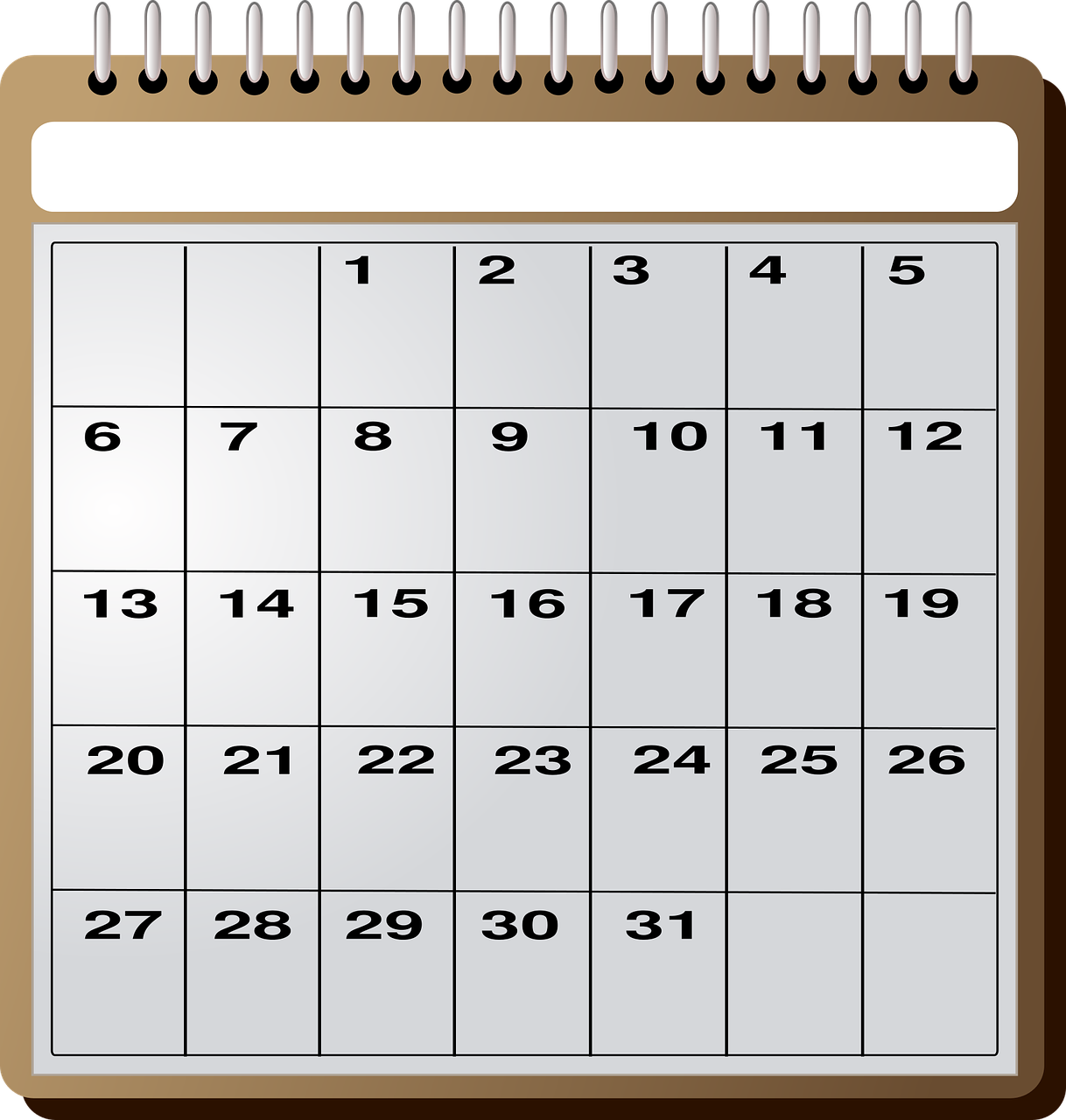
This time of year, I try to assess my household schedule.
I always seem to come up short, too.
At the beginning of the school year I have plans to stay on top of my household cleaning, meal preparation (I will incorporate at least two crock pot meals and a vegetarian meal into our menu each week!), home filing and school portfolios, car maintenance (Isn’t it time for another oil change?), and a whole host of other things I need to keep track of.

I try to plan a bit better each year, too. I buy that new, beautiful organizer that has all the blank spaces I could ever use in order to tailor it to my family’s needs. I print out chore charts. I put together a chalkboard menu planner. At least I can say that my planning is neatly and beautifully organized!
Then life enters my plans. I have a sick child that needs to go to the doctor. The refrigerator stops working, and I need to deal with getting it fixed before all our food goes bad. Our printer breaks, and I can’t print out that test my child needs to take. We’re out of laundry soap, and I need to make yet another trip to the grocery store. Something always seems to take precedence over my perfectly laid out plans.
So why plan at all?
Proverbs 16:9 says “A man’s heart plans his way, but the Lord directs his steps.”
It is important to plan our days. We need to know our responsibilities, see what has to be done, and make the most of the time we are given each day to complete those tasks. We are not to be idle or lazy.
I know, I know.
But every time I try to do this, it seems like a monkey wrench gets thrown into my plans. I have things all worked out. I put everything into its respective little box in my color-coordinated planning system. I should be able to move through the day, checking things off one-by-one as I get things done.
Sooo…take a look at that previous paragraph I just wrote. I used the words “I” and “my” seven times. When I really step back and look at what’s going on in my head (which is for me best done when I write it down), I realize that I am taking ownership of my days, of my household, of my children. But they aren’t mine at all. I am given them as a steward. I am responsible to raise and train my children, keep my household and love and support my husband and family. I am responsible to minister to those the Lord brings to me. I am accountable to be a good manager of what we own.
Yet the Lord is the one who has given these things to me. So I need to be ready to hear him when I am going in a different way. When things don’t go as I have planned, I need to respond selflessly. My gut reaction is to say, “I did not need this to happen today. This has totally messed up my plans!”
Yes. I am selfish. I want things to be done my way. After all, they are good things! I am trying to keep a well-run home, educate my children, share with others. Why can’t these kinds of things go more smoothly?
Because God sees that I need to rely on Him more and on me less. I am to plan, because that gives me a structure from which to work. But I need to realize that God desires me to be obedient to Him, to give my schedules over to Him, and to trust Him. He is still building character in me.
And I want my children to see that. I don’t want them to think that I am perfect. I want them to know that I am following my Lord – seeking His ways over my ways.
So as I look over my broken lesson plans and am reorganizing my chore charts, I am mindful that these plans are a framework and a good way for me to set forth our days ahead. And no matter how lovely they look, God will make them more beautiful as He adjusts them to be exactly what I need to be doing.

Keeping it Clean
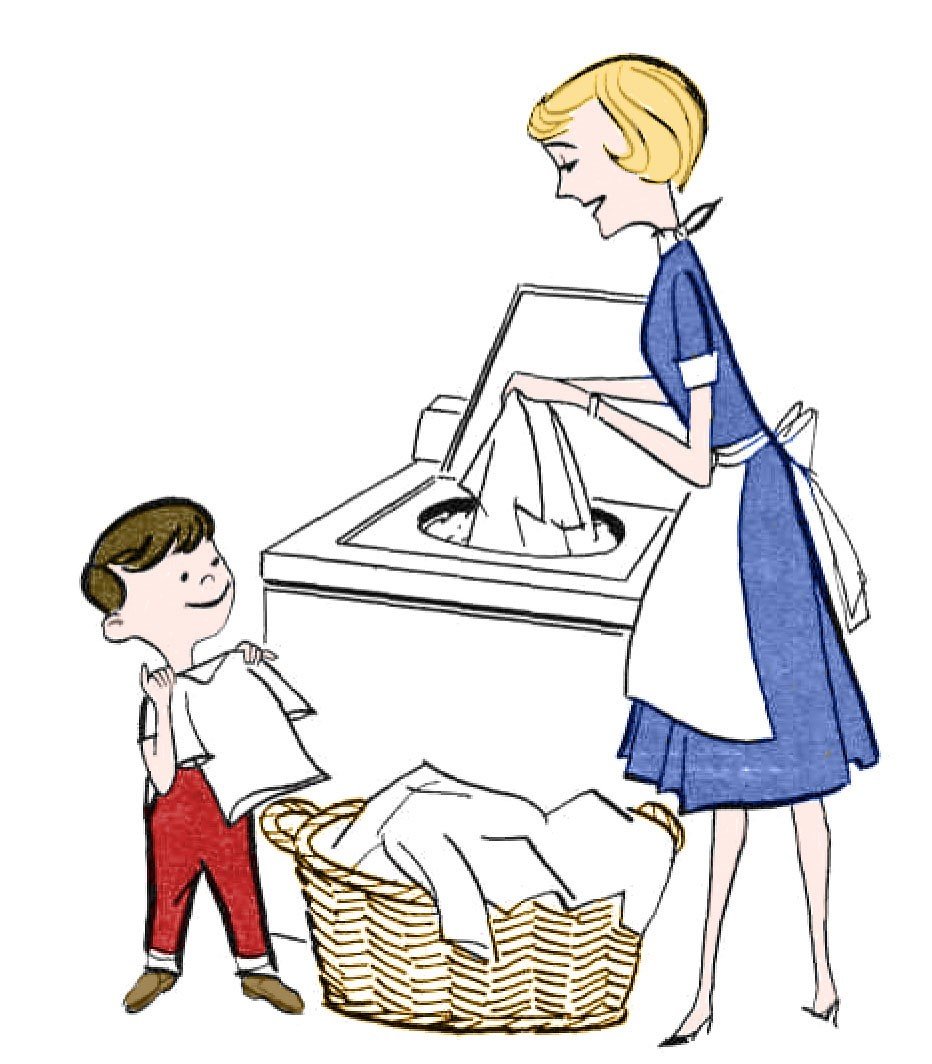

Now that Christmas is over, there is something inside me that clicks, making me want to clean, declutter and re-organize everything. I continue to repeat, “Do we really need this?” to my kids, or “Are we using this?” to my husband.
As we begin to put away the Christmas decorations and find homes for new gift items, I try to make myself get rid of at least one old item for every new one.
A new pair of shoes means getting rid of an old worn pair. A new necklace means finding one I never wear and putting it in the give-away box. New sheets or towels? Time to go through the linen closet and find some worn items to use as rags.
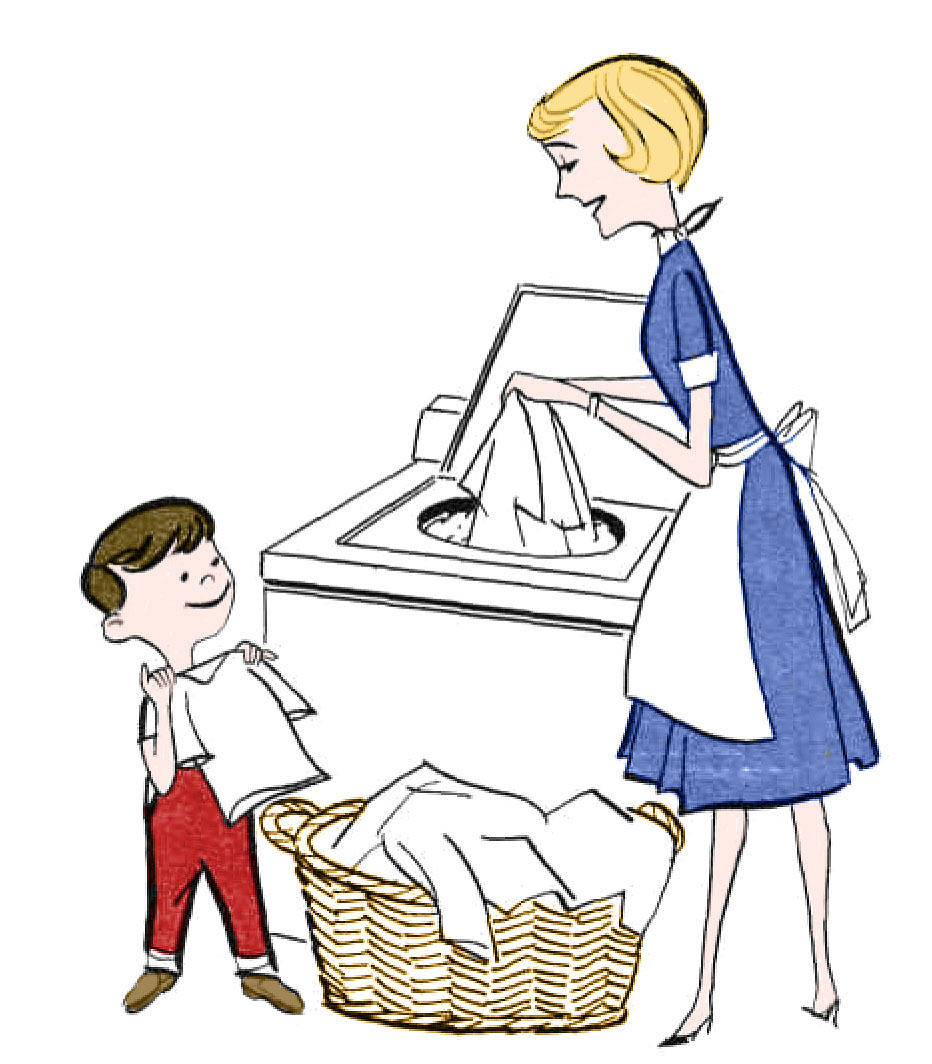
And I get this way about our homeschooling, too. Is that new curriculum I bought over the summer just not working as well as I had hoped? Is one of my children struggling with a subject this year? Maybe I need to do a curriculum double-check. Perhaps I need to take a look at our schedule and see how I can alter what we are doing to make learning a bit easier. Maybe we should drop that extra class (or maybe we should add one).
This is a great time to clean out, organize and reevaluate lots of things in our household, and I encourage you to do it. During these last few days of break, take a little time each day to sort through one or two areas in your house that are a source of organizational frustration. Perhaps one shelf of toiletries that needs to be cleaned out or that junk drawer in the kitchen. Yes, we all have them, it’s no big deal.

Take some time to pray about areas in your homeschool day that are stressful, and ask for wisdom to take a new approach. And understand that it is OK to change curriculum if it is just not working. I know it probably means spending some more money, but you can likely resell the old curriculum, and this is one of the blessings of homeschooling. If a course of study is not working for our children, we have the freedom to change it. Every child learns differently, and we don’t have to make them fit into a cookie cutter plan just because it is the newest thing or it was on sale. Husbands, give your wives permission to make curriculum mistakes. After all, we can’t assess it unless we use it, and sometimes it just doesn’t fit!
And most importantly, if you do change educational course mid-year, know that you are NOT behind a semester. You have actually given your child a 6 month head start in studying in a way that better fits their learning style.
It’s a great way to begin the new year!
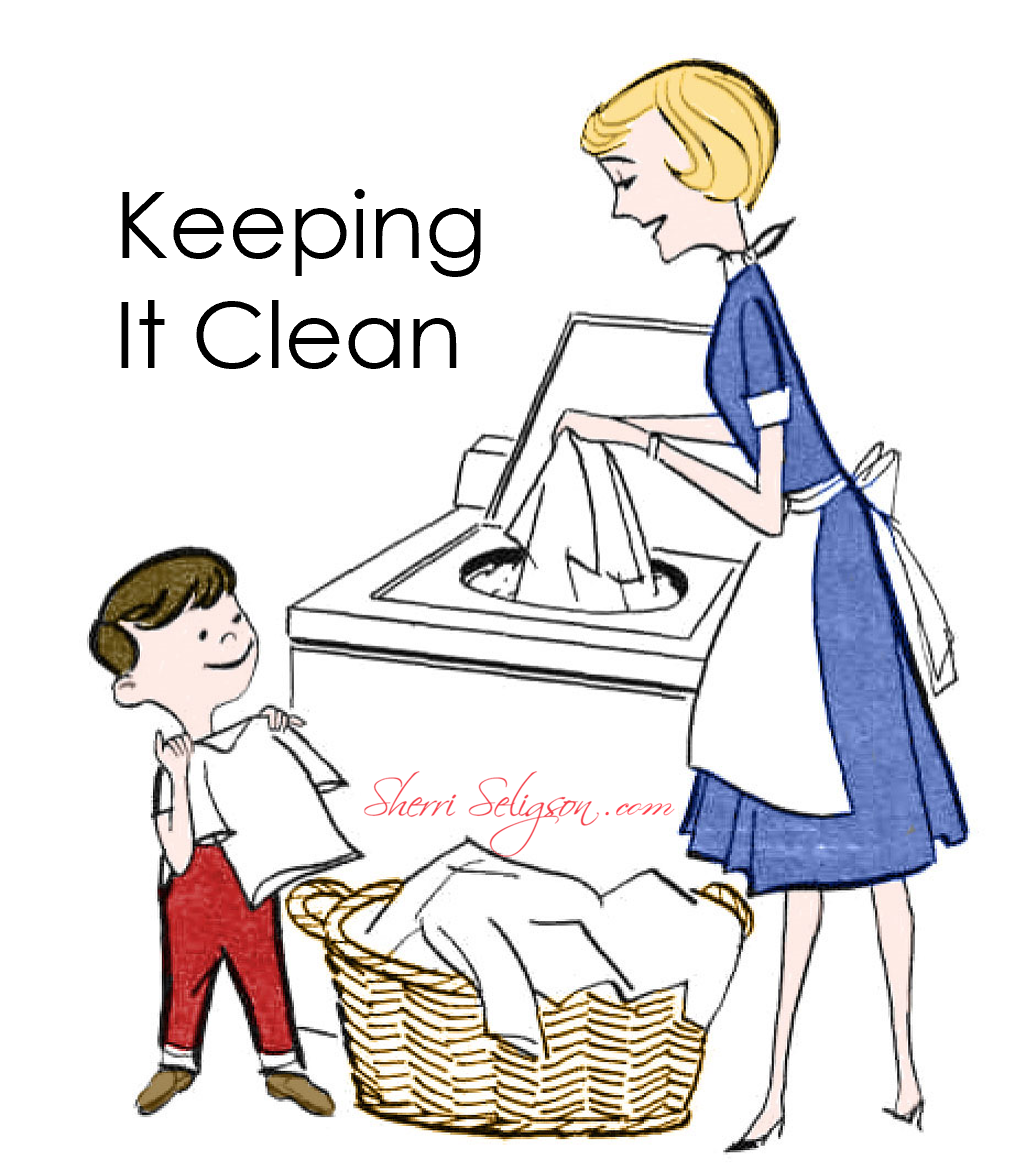
A New Day!


Don’t you love waking up and realizing that the whole day is ahead of you? It is a great design that God gives to us: a new start each day, a fresh beginning.
If you are remembering yesterday as a day filled with incomplete tasks or things said out of frustration, know that you can bring those things before the throne of the Lord and ask Him to give you wisdom about what to do today. Don’t worry about what happened yesterday. Yesterday is over. I know that sounds a bit sappy, but you can’t go back and re-do it. What you CAN do is take charge of what is ahead of you today, asking God for guidance. If you need to ask forgiveness for anything you did yesterday, go to the person (or people) involved and just do it. Then bring it before the Lord. He has already forgotten it. Done!
Now prayerfully begin today with thanks, and then boldly enjoy what is ahead!
Why Do Comfort Foods Make Us Feel So Uncomfortable?

As the holidays approach, it is a constant battle for moms to balance preparing healthy foods for their families and providing fun, comfort foods that are special. Why are these two food categories at odds?
Comfort food = buttery, sugary, chocolatey, rich, cheesy, and yummy. Healthy food = dry, grainy, unflavorful, bitter, cold, raw, yucky.

Is that really how it has to be? I know that I am always battling in my mind when I make a meal: Do I make a veggie and quinoa salad as a side dish or Grandma’s amazing scalloped potatoes? The first is good for you and tastes OK, but the second is rich, creamy, delicious and takes me back to when I was a child and the world was safe, fun, simple and warm. Now that’s comfort!
This internal battle in my head is even more noticeable at Christmas and especially more prominent now that we have a son with Crohn’s. I just can’t serve that cookie without a pang of guilt. And if I serve the rich, yummy stuff, I feel badly that I am not giving my family the best food for their bodies (even if they LOVE it!).
But look at the comparison again. It isn’t just the taste that makes comfort food so comfortable. It’s the feeling it gives us. It brings us back to our childhood – a time when we didn’t have responsibilities, when we didn’t have to worry if things were good for us or not. (That was Mom’s job!)
Comfort food is not necessarily unhealthy food…it’s the yummy food we were served when we were kids, during a time in our lives when we were free to just trust what was served to us. No worries. No responsibilities. Comfort.
So maybe if I focus on providing delicious food that is also healthful, then my kids will equate those foods with the comfort of being home, being safe.
That is what I’m going to be searching for in foods: delicious, warm, and fun. Is that too much to ask? Am I going for the proverbial wanting of my cake and eating it too?
Yes, I am.
But I am determined to find a cake that will be good for us, too.

Is It Christmas Break Yet??

I love how some radio stations choose to play continuous Christmas music from Thanksgiving until Christmas day. It is so enjoyable to be able to turn on the car radio and sing along, often to a tune that truly celebrates the birth of our Savior! After Thanksgiving last year, my daughter and I were driving in the car together, running some errands. Of course, I flipped on the radio, hoping to hear a Christmas carol or some fun Charlie Brown jazz. But instead a Bing Crosby oldie was playing.

I absent-mindedly began thinking about which errand I needed to drive to first and got caught up in navigating among traffic. The car was quiet as my daughter was listening to the song. She suddenly said, “Hey Mom. That is totally different from our family.”
“What do you mean, honey?” I asked, finally paying attention to the radio.
She answered, “You don’t think like they do!” Of course, I had no idea what she was talking about, but I OFTEN don’t think like what is sputtered out of the radio these days, and yet, since I was not paying attention to the music, I began to focus on the soft crooning coming out of the speakers.
It was the song, It’s Beginning to Look a Lot Like Christmas. I probably have heard that song dozens of times before, so I really didn’t understand what my daughter was talking about. She told me to listen for the refrain again. They were singing “…and Mom and Dad can hardly wait for school to start again, it’s beginning to look a lot like Christmas…”
“There.” she said, “That part. You can wait for school to start again, can’t you?”
She was right. I had been looking forward to the Christmas school break as much as my kids were. We had all been busy through the fall, doing projects, working through math, traveling to play sports and piano. I was ready for a break. I was excited to be able to decorate our house with the kids, build gingerbread houses, bake some bread, go to the park, or meet with another family to play. In fact, the errands we were running that day included a trip to the craft store so we could do some fun activities.

I was enjoying the break. Having fun with my children. Frankly, the thought of school starting again did not bring instant joy to my heart (at least at that moment).
I began to think about the song lyrics again. Why were the “Mom and Dad” in the song so anxious for school to start again? I had heard that sentiment from my friends and neighbors who did not homeschool. They were fretting about what they were going to “do with the kids” and how to “keep them busy” during Christmas break. Once school would start after the holidays, they didn’t have to worry about keeping the kids occupied, and they could get on with their regular activities.
I began to smile. As a homeschooler, I realized that though it takes great effort to educate my children, I love it. I love being able to spend time together with them daily as we do our work. And when we have a school break, we then get to play together. But the operative word here is together. I realized that I don’t view my children as obstacles to the plans I may have in my day. My day is filled with being with them. Learning with them. Growing with them. God teaches them daily, and He teaches me daily.
So when we get a break from homeschooling, we are ALL excited. We ALL look forward to having some time off together. And though we all feel a little sad (well, sometimes more than a little sad), when the break is ending, we still get to be together, doing what God has for us that day.
I know that if my heavenly Father desires to be with me each day, then I am right to desire to be with my children each day. That is the blessing of homeschooling. And that is the joy we ALL have when it begins to look a lot like Christmas!

Am I Ruining My Child?

I remember that day well. I was tired. Sleeping through the night was something I could only dream of. That is, if I could sleep long enough to dream it. I was working with one of my children on math. We had come to a topic that was particularly challenging, and this was Day 5 of covering the SAME lesson.I know. That is the “beauty” of homeschooling. We have the blessing to zip through a lesson if our child grasps it quickly and the luxury of camping on a more difficult lesson until it is learned. But this was Day 5 of camping. I was ready to roll up my tent and move on. How many more ways are there to teach this concept? I kept thinking, “Why don’t you get it, yet?” I kept praying for patience and grace to teach the lesson again.
It’s times like this when the thoughts begin to creep in.
“You aren’t skilled enough to teach this.”
“A real teacher woud identify a learning issue if there is one.”
“You’re ruining your child.”
Oh. The coldness of that one. Those words go straight to the heart of a mama and begin to crush it.
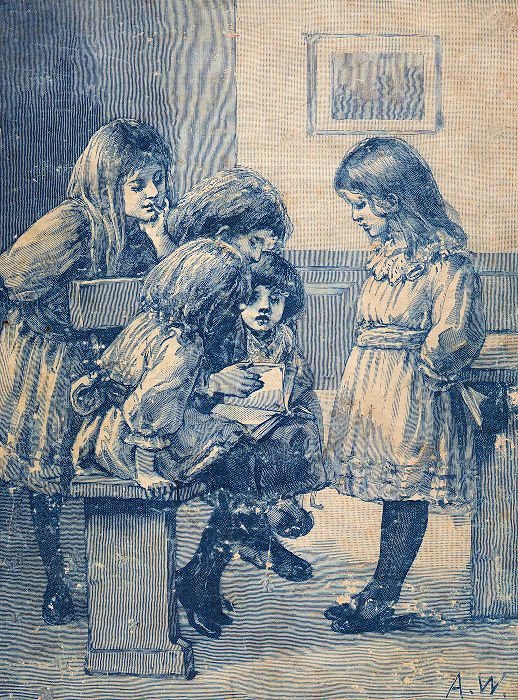
My husband and I keep a folder for times like this. It’s a simple manila folder we keep in our file cabinet. And it is labeled “Why We Homeschool.” Inside we put printouts of encouraging things we read on line. There are magazine articles chronicling how successful homeschool graduates are. I’ve even put in torn pieces of paper with Bible verses on it. Anything that encourages me and helps me to remember the reasons we began homeschooling in the first place. The folder is always available to open during times when I am wavering; when things get hard.
You’ll hear me refer to this little folder from time to time. I like to call it my Egypt Folder.
You know. When the Israelites were enslaved in Egypt, and God performed miraculous deeds of plague, locusts, etc., to get a powerful ruler such as Pharaoh to free his work force. That was not a forgettable thing. But the Israelites forgot.
They were slaves. God took hold of the earth and did things that went against the natural order of the things He set in place. How could they forget that? How could they not remember that God wanted them to be a free people?
You know, God did the same thing with our family. He made it evident to us that we should be training and educating our children at home. And if He did that, I need to trust that He will bring the manna when I am hungry and the water when I am thirsty. He will bring the strength to teach that math lesson again, with patience.
And he knows that this is the best thing for my child. He would not call me to do this and not provide the strength I would need to carry it out. He would not call me to do this if there was something better for my child.
No. I am not ruining him.
Yes, sometimes it’s hard; sometimes I feel like it would be better off to be a slave in Egypt. But I look at my folder and see the reasons why we homeschool and remember. I get correct perspective.
And I open up that math book once again.
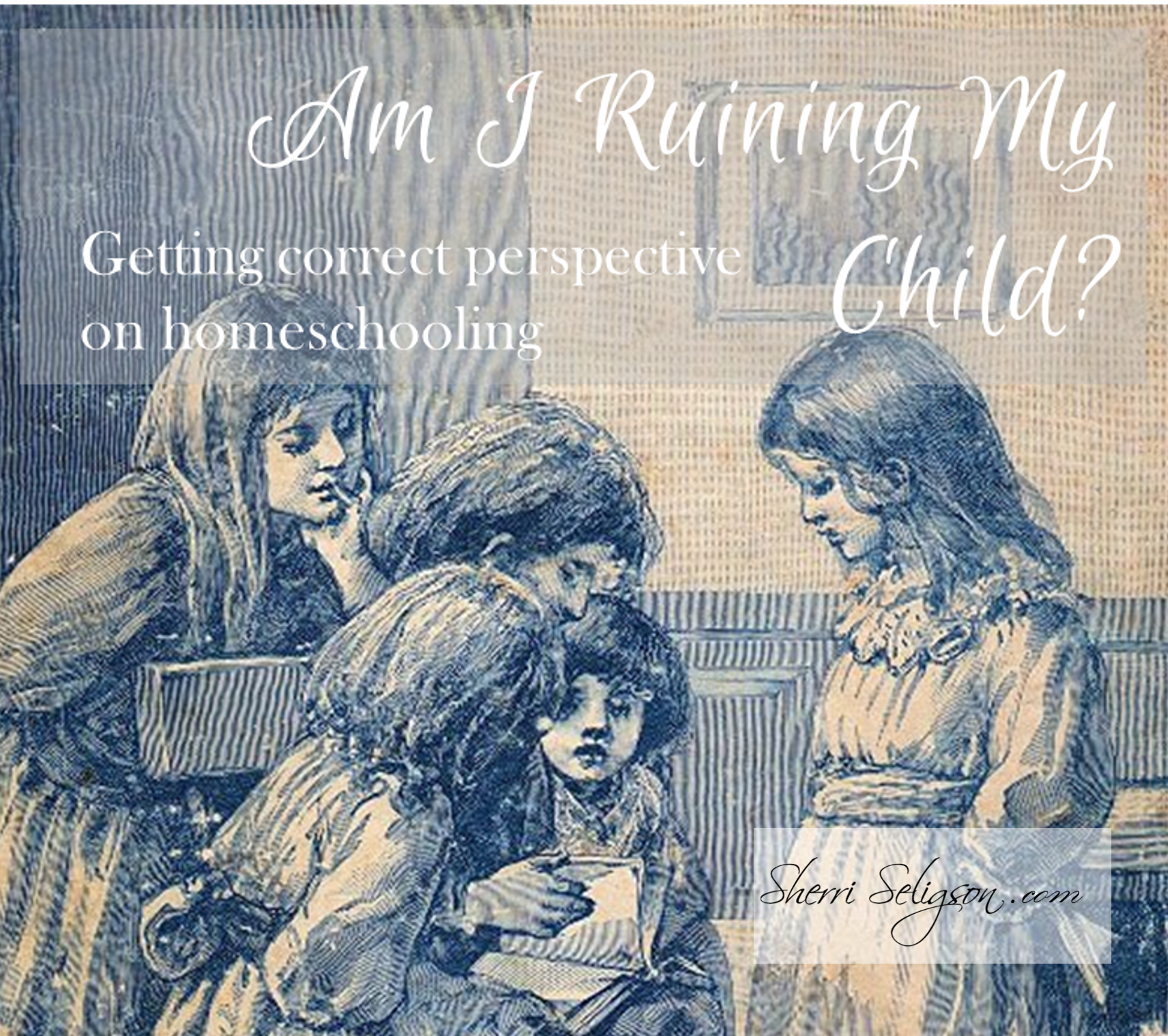
Small Technology, Big Discoveries, Huge Implications

“The world is getting smaller and smaller.” This is the mantra we keep hearing with the advancing technologies of today. Everything seems to be shrinking, from flat-screen televisions, to cell phones, to GPS systems. It is amazing to see what the next new thing will be as new advances seem to multiply man’s “progress.” Yet, this technological explosion can sometimes be scary, because with new innovations, come new discoveries, and these new breakthroughs often force us to re-evaluate what we believe or know. As Christians, how should we face these new discoveries? It can be scary, hearing about what the scientific community is proclaiming. How does our faith fit in to all this science?
Recently, I had the opportunity to sit in on an upper-level university science class with my son. Molecular Biology…no, it didn’t sound too daunting to me. I had studied pre-Med in college, so this should be good “review.” Or so I thought…
As the instructor began the lecture, I had a few major revelations. The first one was that the university classroom experience had drastically changed from when I was in school. There were laptops everywhere, including the one in front of the instructor (who is younger than I am!). He was presenting a power point lecture (Gone are the days of white boards or chalkboards!). And note-taking had changed because all his slides were available to the students ahead of time, so students were either recording the lecture or adding notes to their laptops.
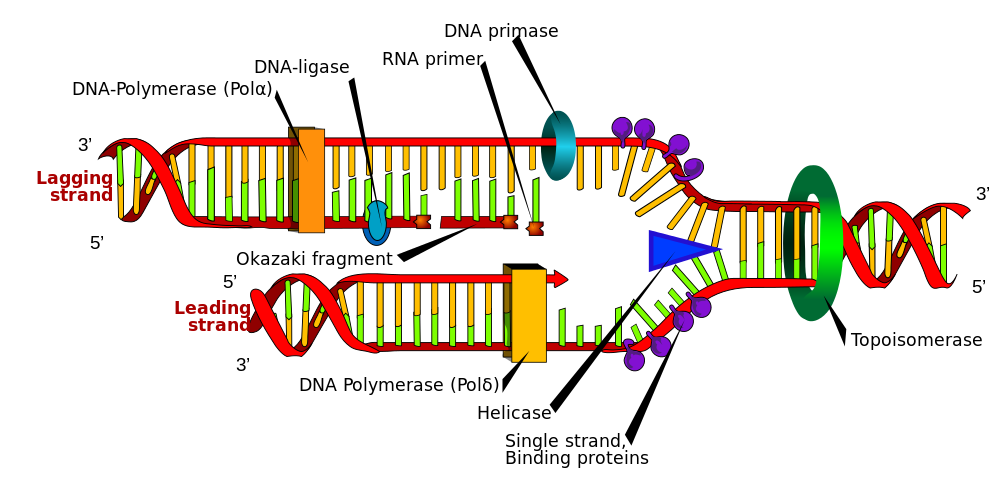
DNA_replication_en.svg
Well, I could deal with that. I use a laptop often, and am even comfortable with power point presentations. Yet I wasn’t prepared for what hit me next. We were being presented with information about what went on in a cell. And not just in a cell, but in its tiny organelle: the nucleus. The instructor was discussing the intricate process of DNA replication. And not just DNA replication, but how the DNA replicating “machinery” made of specialized proteins makes simultaneous copies in four different directions, some of it being “read” backwards and then translated forward. AND that there are other protein machines that patrol the newly-made copies of DNA, checking for accuracy and providing repair. Scientists have actually discovered eight different quality-control mechanisms. Eight!
Have you ever drawn a picture of a stick man? As I sat there in the lecture hall, I felt that I had learned the “stick man” version of the cell when I was in college…just the basic parts, like a head, body, arms and legs, and how they moved. Now, only a couple of decades later, scientists have discovered a completely new world inside the cell. It was like taking my stick man and adding Michelangelo-like details.
I was amazed and humbled. I realized how much more there was to the life sciences to which I was completely unaware! Moreover, these were processes occurring in a bacterial cell: the tiniest of living creatures!
At this point in the lecture, a final realization struck me. These intricate systems were occurring in a bacterium. A “simple” creature. A creature supposedly borne out of a primordial ooze where chemicals and a zap of energy theoretically came together to form the first life.
No, indeed, these are not simple processes. Technological advances have given us a greater understanding of what is going on inside the tiniest of creatures. And these processes require finely-tuned steps, using large, specially-formed proteins that work together in a beautifully choreographed process to keep a bacterium alive. Now consider these processes multiplied to all of the trillions of cells in our bodies, and the feeling of awe begins to set in.
I knew then that these new scientific discoveries weren’t foreboding, but rather, exciting. The more we learn about the complexities of a single bacterial cell, the more it becomes clear that from the tiniest of creatures to the largest, there is an Organizer who is upholding it all. It becomes even more difficult for those who hold to evolutionary theory to explain the origin of life.
So I say “Thank you!” to modern technology for giving me renewed encouragement in what I already trusted to be true. If we honestly believe that our God is the creator of everything, we should be excited to await all the new discoveries that science has to offer! Advanced innovations and the latest findings that result from them can help us learn more about the omnipotent Lord we have.
And maybe, when our family graduates our youngest child from homeschool high school, I need to go back to college with her!
“So Where Do YOU Work?”

As a mom, I consider myself somewhat tech savvy. I have a Facebook page, I tweet, I use Instagram, Pinterest, and I even know what Snapchat is (though I don’t use it). I am pretty familiar with the features of my smart phone, too, using it for many more tasks than actually phoning someone on it.
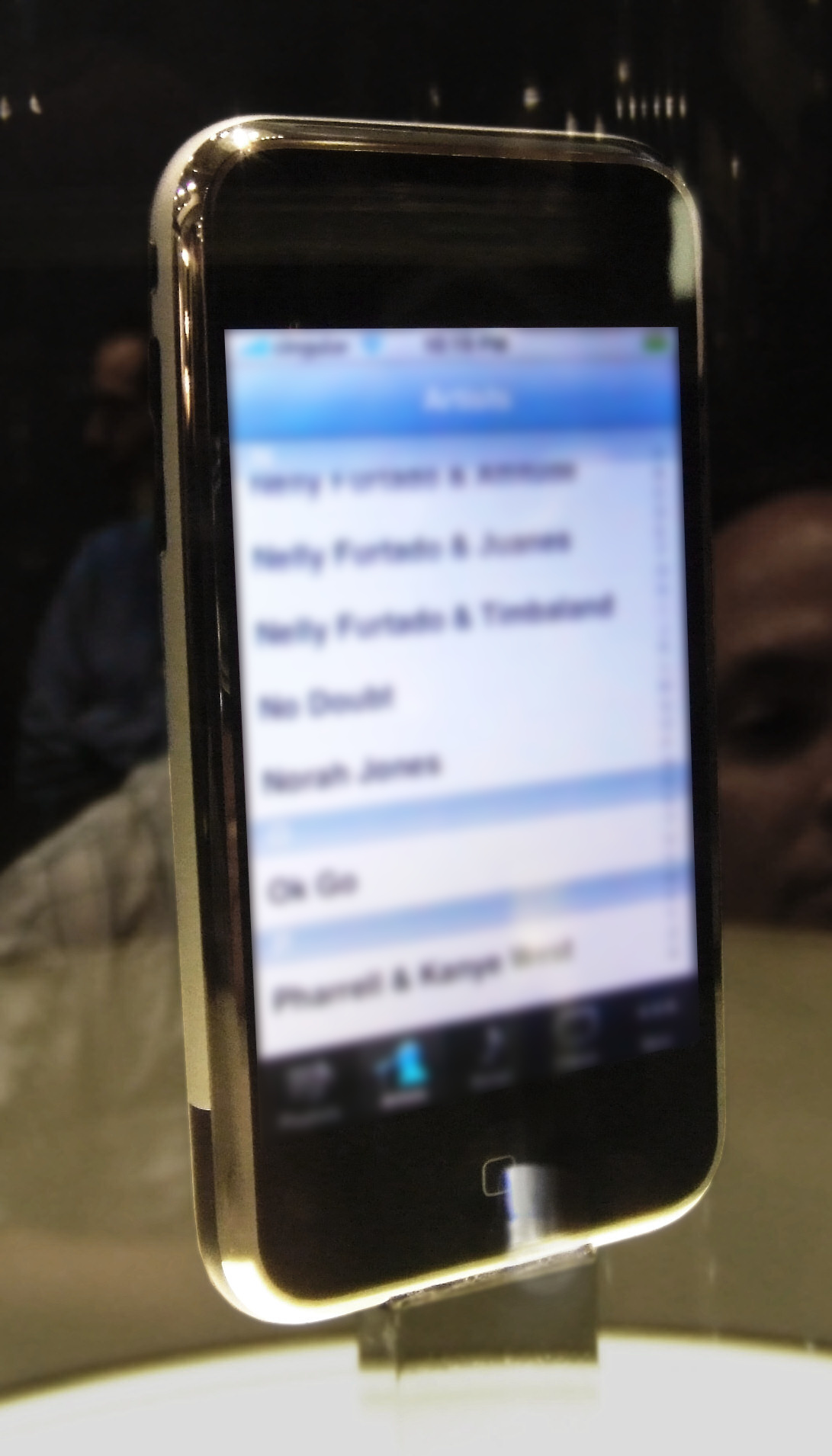
I use the GPS when I’m out of town to find my way around. I take photos for my media posts, take notes on it, and use it to create mini graphics. It sends me notifications of messages, email and comments.
But the other day my phone did something that I thought was wrong. There must have been a glitch or some kind of mis-signal.
You see, whenever I am away from home, my phone notifies me how far away I am from home base. I think it is a convenient bit of information, especially when I am in an unfamiliar part of town.
But a week ago, my phone did something odd. It notified me how long it would take me to DRIVE TO WORK.
“Time to work 18 minutes.”
But I was at home…I do not have a job.
Well, I am not employed. I’m a homeschool mom. I do work. But it is definitely at home. So, what was my smart phone “thinking?” Where was work? I clicked on it.
And, at first, I laughed. My smart phone was telling me I was 18 minutes from work, and my workplace: Super Target.
Well, I don’t work there. Why in the world would it think I did? I certainly shop there to buy household items, clothes for the family, and even groceries. In fact, I would say I go there every week or so. Kind of regularly.
You know what I mean. It is just part of my weekly routine of keeping my house. That is my job.
Then I realized it. My smart phone is pretty smart after all. Indeed, I am not employed at Target. But my “work” takes me there. And quite often enough to consider it one of my work locations.
“Hmmm. Pretty good, smart phone. You really don’t miss anything.”
Maybe I should explain this to the Target people the next time I am there. After all, don’t folks get a discount at the place where they work?
